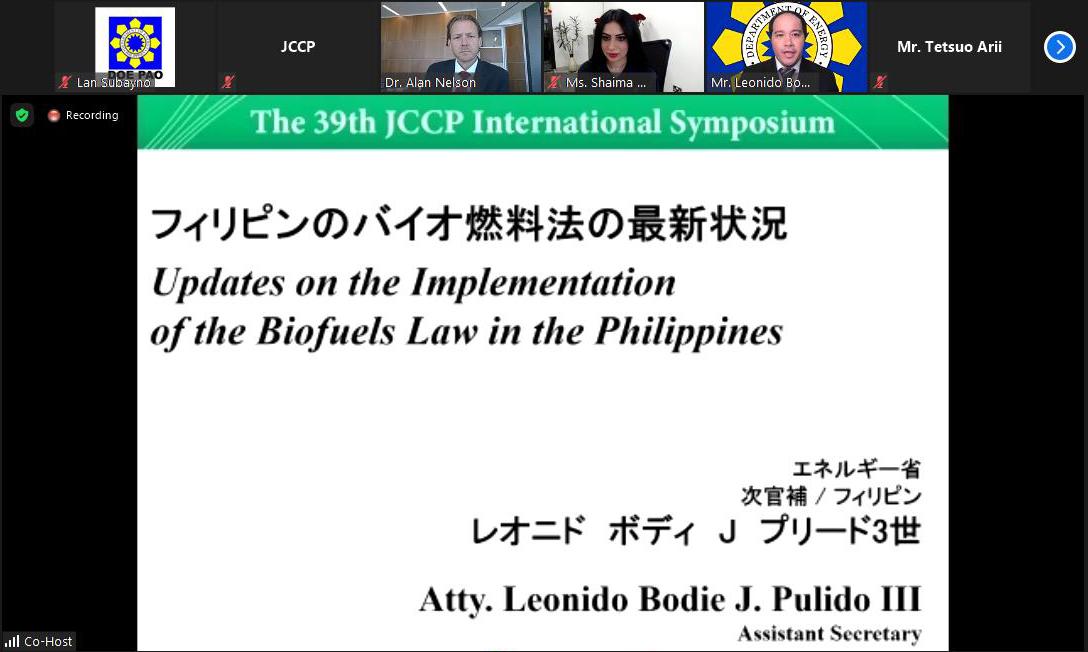
UNIFIED RELATIONS: Department of Energy Assistant Secretary Leonido J. Pulido III delivered a presentation on Republic Act No. 9367 or the Biofuels Act of 2006 during the Japan Cooperation Center Petroleum (JCCP) International Symposium on Thursday (28 January). The event was held virtually via Zoom with over 400 participants composed of energy experts from oil-related institutions. The JCCP International Symposium aims to provide opportunities for oil-producing countries to achieve their common goal of strengthening and developing closer ties to ensure fairness in the future supply of oil.
TAGUIG City – The Department of Energy (DOE) discussed its plan to increase the contribution of biofuels in the country’s energy mix during the 39th Japan Cooperation Center Petroleum (JCCP) International Symposium, which was held virtually for the first time last Thursday (28 January) due to the COVID-19 pandemic.
With the theme, “Outlook and Challenges for the Oil Industry Standing at the Crossroads-Contributions and Strategies for a Sustainable Society”, the online symposium provided an avenue for the global exchange of ideas on the current situation of the oil industry, strategies on overcoming industry challenges, and the exploration of potential opportunities amid the global health crisis.
“As Philippine Energy Secretary Alfonso G. Cusi often highlights, it is our priority in the DOE to craft policies that would help the country achieve energy security, self-sufficiency, and independence. Increasing the contribution of biofuels in our energy mix is one such way since it would reduce our dependence on imported fossil-based fuels, enhance the quality of the environment, and create opportunities for countryside socio-economic development,” DOE Assistant Secretary Leonido J. Pulido III emphasized in his presentation on the implementation of Philippine Republic Act (RA) No. 9637, or the Biofuels Act of 2006.
Under said law, the minimum biodiesel blends are currently set at 10% for bioethanol (E10) and 2% for biodiesel (B2).
To date, there are 12 accredited bioethanol producers in the Philippines, with a total rated production capacity of 380.5 million liters per year (MLPY) as of the end of 2020. This is about 50% of the volume required for E10 under RA No. 9637.
Meanwhile, there are 13 accredited biodiesel producers, with a total rated production capacity of 707.9 MLPY, or almost 300% of the required B2 volume. This indicates that there is more than enough capacity to meet the proposed increase in the biodiesel blend from B2 to B5, should it be pursued this year. Additional capacities with a total of 277.65 ML will be on-stream between the years 2021 and 2022, further pointing to a secured biodiesel supply for the B5 mandate.
Asec. Pulido also discussed the Philippine DOE’s Biofuels Roadmap 2018-2040, which intended to increase the country’s biodiesel requirement to 5% last year. However, the Energy Assistant Secretary pointed out that the pandemic adversely affected this target given the absence of assurances on the sufficiency of biodiesel supply, as well as the emergence of logistical limitations, particularly in transporting biodiesel to the regions where it would be blended.
He added that while there is no immediate plan to increase the bioethanol blend, the long-term goal of the Philippine DOE is to bring it up to 20% by the year 2040.
“We thank the JCCP for inviting us to talk about our country’s biofuels program. It is an on-going effort which is not without its challenges, but we are hopeful that with continued improvements, the program would ultimately help the Philippines decrease its dependence on fossil fuels as we transition towards a more sustainable energy future,” Asec. Pulido said.
Key government and private sector officials from all over the world participated in the 39th JCCP Symposium. Among the speakers who joined Asec. Pulido were Saudi Arabian Deputy Minister for Policies and Strategic Planning, H.E. Dr. Nayef Al-Musehel; Iraqi Deputy Minister for Refining Affairs, H.E. Dr. Hamid Younis Saleh; Iranian Deputy Minister for Management and Human Capital Development, H.E. Dr. Farzin Minoo; Japanese Natural Resources and Fuel Department Director-General, Mr. Minami Ryo; and Indonesian Oil and Gas Director-General, Dr. Tutuka Ariadji.
###
